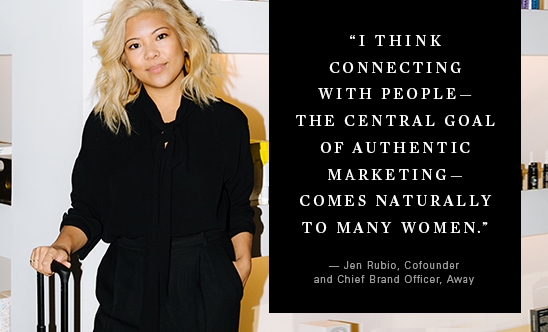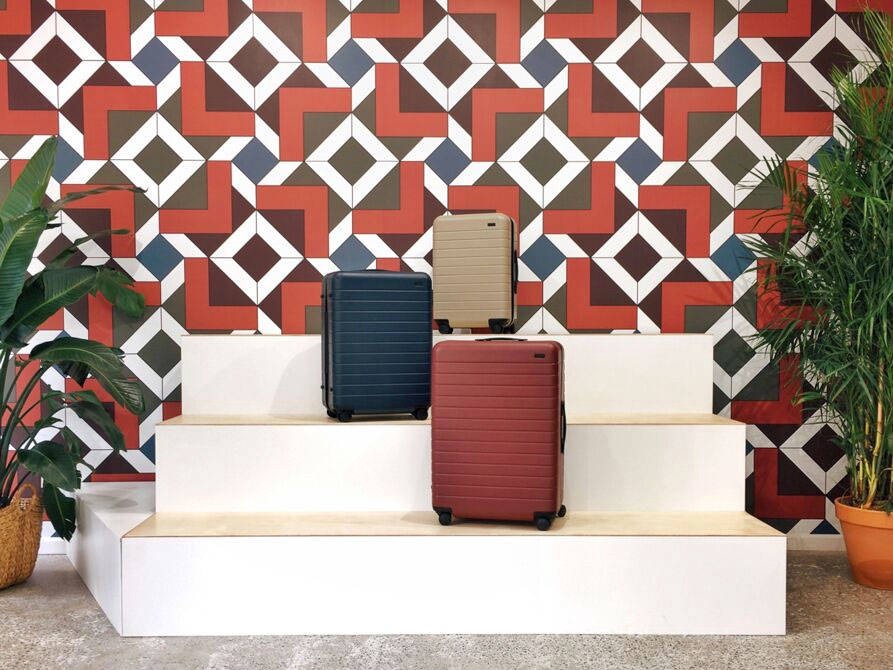
“We know that the difference between a good product and a good brand is emotion.” — Jen Rubio, Cofounder and Chief Brand Officer, Away
Jen Rubio is cofounder and chief brand officer of Away, the self-described “thoughtful” travel brand that launched two years ago with a stylish, affordable suitcase and has grown rapidly, expanding into more parts of the travel space. She recently spoke to SheReports about marketing authentically, something she says comes more naturally to women.
What was the genesis of Away?
The idea for Away actually came about when I was traveling and my suitcase broke. I called my most well-traveled friends and none of them could recommend a decent option to replace it. So my cofounder, Steph Korey, and I decided to look into why that was, and whether or not we could fix it. What we saw was a real gap in the market. There wasn’t a luggage brand that truly understood the way people travel today, so our goal was to create something even bigger: a travel brand that helps people explore the world more seamlessly.
When we were designing our first carry-on, there were a number of “smart” or connected features that we could have included. But what we found was that a lot of these features were just gimmicks that didn’t actually solve real problems, and they’d ultimately end up adding unnecessary cost to the consumer.
So instead of calling our products “smart,” we call them “thoughtful,” because our bags are designed with everything you need but nothing you don’t. Our carry-ons include a built-in removable charger, because several people we spoke with told us that one of the biggest pain points about their experience is when their phone dies at the airport and they have no way to charge it. That’s just one example, but every single feature of our bags is there to make your trip more seamless.
So instead of calling our products “smart,” we call them “thoughtful,” because our bags are designed with everything you need but nothing you don’t.
We launched Away just over two years ago, and since then, we’ve opened retail locations, introduced a range of travel essentials beyond our first carry-on and aren’t setting limits for what might come next.
You run the creative side and the branding. How much of that growth is the product, and how much is your smart marketing?
A good product doesn’t equal a good brand, but you can’t have one without the other if you’re going to be truly successful. We know that the difference between a good product and a good brand is emotion — so we’ve built a company that prioritizes both simultaneously, and I think that’s what people have connected with.
Context is everything, so while the wheels or the zippers on our suitcases are great, what gets people more excited is when they think about what they can actually do with their suitcase. We tell stories that we hope will empower people to book their next trip, and use marketing to make sure those stories reach people.
We know that the difference between a good product and a good brand is emotion — so we’ve built a company that prioritizes both simultaneously, and I think that’s what people have connected with.
Are there different ways you market a travel product to women than you do to men?
We have a unique perspective on all things travel, and we know that what we have to say won’t resonate with everyone. But by curating stories and a point of view that’s consistent across every one of our platforms, we’ve created a familiar voice that translates across a wide variety of audiences. We believe that type of authenticity — rather than trying to shift our voice just to appeal to a particular gender — will build trust among our growing community and convert them to lifelong customers.

You and your cofounder are both women. Do you think that affects how you think about your approach to marketing?
Ithink connecting with people — the central goal of authentic marketing — comes naturally to many women. I think that particular quality is something that’s helped me in a lot of aspects of my career and definitely in terms of my ability to tell a good story.
It’s also interesting that many of our earliest supporters were millennial women. I think we were able to uniquely connect with them, specifically because we are them.
You’re a woman who travels a lot. Do you have any pet peeves about how travel brands speak to you as a woman?
This problem isn’t limited to travel brands, but I think that a lot of companies miss an opportunity to form a human connection with their customers. They struggle to understand their customers’ unique needs and interests, so anything they say when they’re trying to reach them runs the risk of feeling inauthentic.

There’s often a disconnect between what they’re trying to say and what women and men actually want to hear. They use industry jargon or some company slogan that feels gimmicky — and doesn’t serve the ultimate goal of actually persuading any type of brand loyalty.
This problem isn’t limited to travel brands, but I think that a lot of companies miss an opportunity to form a human connection with their customers.
We’re at an advantage as a direct-to-consumer company because we have an open line of communication with every single one of our customers. We know what kind of travelers are out there and have an awareness of their unique experiences, so there’s a built-in authenticity in the way we engage with them. They see a reflection of themselves in us.
More From the March Travel Issue of SheReports:
- Women Who Don’t Travel
- Women Who Travel
- Her America: The Year-Long Journey
- Record-Setting World Traveler
- Lip Gloss in Space
- #SheDidThat: Annie Londonderry


